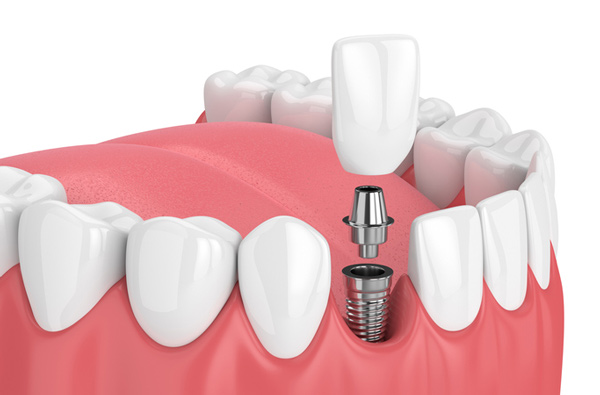Dental Implants vs. Bridges and Dentures
Charlotte, NC
 When it comes to replacing missing teeth, patients have several options to consider, including dental implants, bridges, and dentures. Each treatment type offers its own set of advantages and considerations, catering to different patient needs and preferences. Exploring the differences between the various tooth restoration options we offer here, including dental implants, dental bridges, and dentures, helps our patients make informed decisions about their oral health. At Myers Park Dental Partners, our dentists are here to assist you with bringing your smile back to life, both functionally and aesthetically, as both aspects are vitally important. When it comes to replacing missing teeth, patients have several options to consider, including dental implants, bridges, and dentures. Each treatment type offers its own set of advantages and considerations, catering to different patient needs and preferences. Exploring the differences between the various tooth restoration options we offer here, including dental implants, dental bridges, and dentures, helps our patients make informed decisions about their oral health. At Myers Park Dental Partners, our dentists are here to assist you with bringing your smile back to life, both functionally and aesthetically, as both aspects are vitally important.
Understanding Dental Implants
Dental implants are titanium posts that are surgically placed into the jawbone. Sometimes they are also made out of the material ziroconia. These implant posts are what serve as your new artificial tooth roots. Dental implants provide a stable foundation for prosthetic teeth, such as dental crowns, dental bridges, or dentures.
Dental implants offer several benefits. Here are just a few of them:
| • |
Natural Look and Feel: Dental implants closely mimic the appearance and function of natural teeth, providing a seamless and comfortable fit.
|
| • |
Longevity: With proper care, dental implants can last a lifetime, making them a durable, permanent, and cost-effective tooth restoration solution.
|
| • |
Preservation of Jawbone: Dental implants help stimulate the surrounding bone tissue, preventing bone loss and preserving the integrity of your jawbone.
|
| • |
Improved Oral Health: Unlike dental bridges, which require adjacent teeth to be shaved down, dental implants do not compromise any neighboring teeth, promoting better long-term oral health. |
Not everyone is a suitable candidate for dental implants. Ideal candidates for dental implants typically have the following:
| • |
Sufficient Bone Density: Sufficient bone volume is necessary to support dental implant placement. In cases of bone loss, bone grafting procedures may be required before receiving dental implants.
|
| • |
Good Oral Health: Patients should have healthy gums and no active periodontal disease to ensure the success of implant treatment. If you are in the early stages of gum disease, we may have the opportunity to treat it before it gets too advanced, and you may still be able to get dental implants.
|
| • |
Overall Health: Patients should be in good overall health and free from conditions and lifestyle habits that may impair healing, such as uncontrolled diabetes, autoimmune disorders, or smoking. |
Exploring Dental Bridges and Dentures
Dental bridges are prosthetic devices used to replace one or more missing teeth. They consist of artificial teeth, also called pontics, which are anchored to adjacent natural teeth or dental implants. Dental bridges offer the following benefits:
| • |
Restored Function: Dental bridges restore chewing ability as well as speech clarity, allowing patients to eat and speak comfortably once again.
|
| • |
Aesthetic Enhancement: Dental bridges can improve the appearance of the smile by filling in gaps left by missing teeth.
|
| • |
Relatively Quick Treatment: Compared to dental implants, dental bridges require fewer appointments and may be completed more quickly. |
However, dental bridges have some limitations. These could include:| • |
Increased Risk of Decay: Dental bridges may increase the risk of decay and gum disease in the supporting teeth, as they require adjacent teeth to be shaved down for support.
|
| • |
Potential for Bone Resorption: Unlike dental implants, dental bridges do not stimulate the surrounding bone tissue, which may lead to bone resorption over time. |
Dentures
Dentures are removable prosthetic devices used to replace multiple missing teeth or an entire dental arch. Dentures may be the most well known and most common type of tooth replacement around. They come in two main types: full dentures, which are for complete tooth loss, and partial dentures, for partial tooth loss.
Dentures offer the following advantages:| • |
Affordability: Dentures are often more affordable than dental implants and may be covered by dental insurance plans.
|
| • |
Non-Invasive Treatment: Unlike dental implants, dentures do not require surgery for placement, making them a suitable option for patients who may not be candidates for surgical procedures.
|
| • |
Restored Appearance: Dentures restore facial aesthetics and provide support for the lips and cheeks, preventing the sunken appearance that is associated with tooth loss. |
However, dentures also have some drawbacks, including:| • |
Reduced Stability: Dentures may shift or move during eating or speaking, leading to discomfort and potential embarrassment.
|
| • |
Bone Resorption: Like dental bridges, dentures do not stimulate the underlying jawbone, which can result in bone resorption and changes in facial structure over time. |
While both dentures and dental implants offer solutions for tooth replacement, they differ significantly in terms of stability, longevity, and impact on oral health.
| • |
Stability: Dental implants provide superior stability compared to dentures, as they are anchored directly into the jawbone. This stability allows for comfortable chewing and speaking without fear of slippage.
|
| • |
Longevity: Dental implants have the potential to last a lifetime with proper care, whereas dentures typically require periodic adjustments and replacements every few years due to changes in jawbone structure and wear and tear.
|
| • |
Oral Health Impact: Dental implants help preserve jawbone integrity and prevent bone resorption, whereas dentures may contribute to bone loss over time. |
Ultimately, the choice between getting dental implants, dental bridges, or dentures depends on individual patient factors such as oral health status, budget, and personal preferences. Consulting with a qualified dentist, like one of ours here at Myers Park Dental Partners is essential to determine the most appropriate treatment plan based on each patient's unique dental needs and goals.
Let Myers Park Dental Partners Help with Your Dental Restorations
Dental implants, dental bridges, and dentures each offer distinct advantages and considerations for replacing missing teeth. While dental implants provide the most natural look, feel, and function, bridges and dentures may be suitable alternatives for patients with specific oral health needs or budget constraints. By understanding the differences between these treatment options and consulting with our dental professionals, our patients can make well-informed decisions to restore their smiles and overall oral health. Contact us today to request an appointment. You can call us to schedule an appointment at (704) 332-2532 or request an appointment through our website. We look forward to working with you. |
